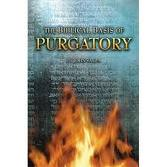[powerpress]
 The Sunday, Sunday, Sunday Podcast is a reflection on the upcoming Sunday Mass readings presented by LifeTeen.com and hosted by Mark Hart.
The Sunday, Sunday, Sunday Podcast is a reflection on the upcoming Sunday Mass readings presented by LifeTeen.com and hosted by Mark Hart.
Sunday Readings from the USCCB
Reading 1 Â 1 SM 3:3B-10, 19
Responsorial Psalm  PS 40:2, 4, 7-8, 8-9, 10
Reading 2 Â 1 COR 6:13C-15A, 17-20
GospelJN 1:35-42
John was standing with two of his disciples,
and as he watched Jesus walk by, he said,
“Behold, the Lamb of God.â€
The two disciples heard what he said and followed Jesus.
Jesus turned and saw them following him and said to them,
“What are you looking for?â€
They said to him, “Rabbi†— which translated means Teacher —,
“where are you staying?â€
He said to them, “Come, and you will see.â€
So they went and saw where Jesus was staying,
and they stayed with him that day.
It was about four in the afternoon.
Andrew, the brother of Simon Peter,
was one of the two who heard John and followed Jesus.
He first found his own brother Simon and told him,
“We have found the Messiah†— which is translated Christ —.
Then he brought him to Jesus.
Jesus looked at him and said,
“You are Simon the son of John;
you will be called Cephas†— which is translated Peter.
Lectionary for Mass for Use in the Dioceses of the United States, second typical edition, Copyright © 2001, 1998, 1997, 1986, 1970 Confraternity of Christian Doctrine;
This entry was posted on Saturday, January 17th, 2015 at 2:07 pm
You can follow any responses to this entry through the RSS 2.0 feed.
[powerpress]
 Episode 25 – Seeking Truth with Sharon Doran – Peter’s Profession of Faith (PART 1)
Episode 25 – Seeking Truth with Sharon Doran – Peter’s Profession of Faith (PART 1)
Episode 25 –
Peter’s Profession of Faith (part 1)
“Who do you say that I am?†It is the fundamental question of our lives. Who is Jesus? In tonight’s lecture, Sharon teaches us about Peter and his profession of faith. This passage is overflowing with significance, for both the entire Church at large and for each individual member. As she does so well, Sharon shows us the Hebrew scripture foundation of the words of Jesus. We learn what it means for Peter to be called “Simon, son of Jonah.†We understand the significance of Peter as “rock†and discover the importance of the “keys of the kingdom†and “binding and loosing†as the basis for the magisterial authority of the Catholic Church. But then, Sharon draws close and tightens her focus on our own hearts, asking us the question that we MUST answer for ourselves: “But who do YOU say that I am?†Who is Jesus? Where is He in your life?
Sharon Doran serves as the teaching director of “Seeking Truth.†An experienced Bible Study teacher, Sharon has a passion for scripture that will motivate and challenge you to immerse yourself in God’s Word and apply His message to your every day life.
 “Seeking Truth†is an in depth Catholic Bible Study, commissioned by the Archdiocese of Omaha in response to John Paul II’s call to the New Evangelization as well as Pope Benedict XVI’s exhortation for all Catholics to study scripture. To learn more go to:www.seekingtruth.net
“Seeking Truth†is an in depth Catholic Bible Study, commissioned by the Archdiocese of Omaha in response to John Paul II’s call to the New Evangelization as well as Pope Benedict XVI’s exhortation for all Catholics to study scripture. To learn more go to:www.seekingtruth.net
This entry was posted on Friday, January 16th, 2015 at 5:41 am
You can follow any responses to this entry through the RSS 2.0 feed.
I love talking with John Salza…tough doctrine and dogma that for most of us is difficult to explain, is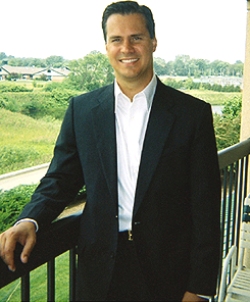 just so easy for John. And he shares his knowledge with all of us…what a gift!
just so easy for John. And he shares his knowledge with all of us…what a gift!
John’s website is www.scripturecatholic.com
[powerpress]
From the book description:
In The Biblical Basis for Purgatory, John  offers the definitive scriptural explanation of this distinctively Catholic doctrine. Building on the teachings of Christ and St. Paul, he shows how the existence of a place of temporal punishment after death is not only a logical extension of what we know about the reality of sin and God’s justice, but is also a supreme expression of God’s love and mercy. Although Purgatory is a place of mercy, its pains are real, and they are severe. This book does more than defend and explain Purgatory it provides a solid plan, drawn from the Church s perennial wisdom for conquering our sins by God s grace, while still on earth.
Tags: biblical basis, catholic, catholic podcast, catholic prayer, cathollc spirituality, john salza, purgatory
This entry was posted on Sunday, November 2nd, 2014 at 12:32 am
You can follow any responses to this entry through the RSS 2.0 feed.
 Episode 22 – Seeking Truth with Sharon Doran -The Miracles of Jesus (PART 2)
Episode 22 – Seeking Truth with Sharon Doran -The Miracles of Jesus (PART 2)
[powerpress]
Episode 22 –
The Miracles of Jesus (part 2)
In this lecture, Sharon illuminates the miracles of Jesus in the most beautiful way.
As we learn this week, Jesus demonstrates dominion over the elements as he calms the storm on the Sea of Galilee.
Arriving on the other side of the sea, Jesus then displays his Lordship over Satan as He heals the Gerasene demoniac, driving a Legion of demons into 2000 swine, who then hurl themselves over a cliff into the sea.
The power of these miracles comes alive in Sharon’s presentation, with Old Testament prophecies jumping off the pages as they are fulfilled one by one.
Yet, in the gentle, quiet healings of Jairus’ daughter and the woman with a hemorrhage we learn even more of Christ’s plan of salvation for a new Daughter Zion.
In a conclusion that is both rich in scholarly insight and flowing with pastoral mercy, Sharon brings us to the realization that we only have to reach out to receive the abundant healing that God desires to lavish upon us.
Sharon Doran serves as the teaching director of “Seeking Truth.†An experienced Bible Study teacher, Sharon has a passion for scripture that will motivate and challenge you to immerse yourself in God’s Word and apply His message to your every day life.
 “Seeking Truth†is an in depth Catholic Bible Study, commissioned by the Archdiocese of Omaha in response to John Paul II’s call to the New Evangelization as well as Pope Benedict XVI’s exhortation for all Catholics to study scripture. To learn more go to:www.seekingtruth.net
“Seeking Truth†is an in depth Catholic Bible Study, commissioned by the Archdiocese of Omaha in response to John Paul II’s call to the New Evangelization as well as Pope Benedict XVI’s exhortation for all Catholics to study scripture. To learn more go to:www.seekingtruth.net
Tags: catholic, catholic podcast, catholic prayer, cathollc spirituality
This entry was posted on Tuesday, October 28th, 2014 at 4:07 pm
You can follow any responses to this entry through the RSS 2.0 feed.
 Episode 21- Seeking Truth with Sharon Doran -The Miracles of Jesus (PART 1)
Episode 21- Seeking Truth with Sharon Doran -The Miracles of Jesus (PART 1)
[powerpress]
Episode 21 –
The Miracles of Jesus (part 1)
In this lecture, Sharon illuminates the miracles of Jesus in the most beautiful way.
As we learn this week, Jesus demonstrates dominion over the elements as he calms the storm on the Sea of Galilee.
Arriving on the other side of the sea, Jesus then displays his Lordship over Satan as He heals the Gerasene demoniac, driving a Legion of demons into 2000 swine, who then hurl themselves over a cliff into the sea.
The power of these miracles comes alive in Sharon’s presentation, with Old Testament prophecies jumping off the pages as they are fulfilled one by one.
Yet, in the gentle, quiet healings of Jairus’ daughter and the woman with a hemorrhage we learn even more of Christ’s plan of salvation for a new Daughter Zion.
In a conclusion that is both rich in scholarly insight and flowing with pastoral mercy, Sharon brings us to the realization that we only have to reach out to receive the abundant healing that God desires to lavish upon us.
Sharon Doran serves as the teaching director of “Seeking Truth.†An experienced Bible Study teacher, Sharon has a passion for scripture that will motivate and challenge you to immerse yourself in God’s Word and apply His message to your every day life.
 “Seeking Truth†is an in depth Catholic Bible Study, commissioned by the Archdiocese of Omaha in response to John Paul II’s call to the New Evangelization as well as Pope Benedict XVI’s exhortation for all Catholics to study scripture. To learn more go to:www.seekingtruth.net
“Seeking Truth†is an in depth Catholic Bible Study, commissioned by the Archdiocese of Omaha in response to John Paul II’s call to the New Evangelization as well as Pope Benedict XVI’s exhortation for all Catholics to study scripture. To learn more go to:www.seekingtruth.net
Tags: catholic, catholic podcast, catholic prayer, cathollc spirituality
This entry was posted on Tuesday, October 21st, 2014 at 4:43 am
You can follow any responses to this entry through the RSS 2.0 feed.
The Sunday, Sunday, Sunday Podcast is a reflection on the upcoming Sunday Mass readings presented by LifeTeen.com and hosted by Mark Hart.
Sunday Readings from the USCCB
Reading 1 Â IS 45:1, 4-6
Responsorial Psalm PS 96:1, 3, 4-5, 7-8, 9-10
Reading 2 Â 1 THES 1:1-5B
Gospel MT 22:15-21
Lectionary for Mass for Use in the Dioceses of the United States, second typical edition, Copyright © 2001, 1998, 1997, 1986, 1970 Confraternity of Christian Doctrine;
Tags: catholic, catholic podcast, catholic prayer, cathollc spirituality
This entry was posted on Friday, October 17th, 2014 at 2:01 pm
You can follow any responses to this entry through the RSS 2.0 feed.
Learn more about St. Jerome in our fascinating discussion with Mike Aquilina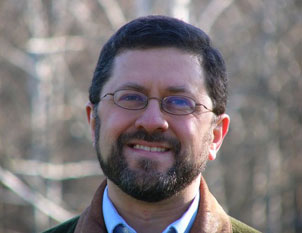
[powerpress]
Spiritual Writings:
 - Letters
-Â The Perpetual Virginity of Blessed Mary
-Â To Pammachius Against John of Jerusalem
-Â The Dialogue Against the Luciferians
-Â The Life of Malchus, the Captive Monk
-Â The Life of S. Hilarion
-Â The Life of Paulus the First Hermit
-Â Against Jovinianus
-Â Against Vigilantius
-Â Against the Pelagians
-Â Prefaces
-Â De Viris Illustribus (Illustrious Men)
-Â Apology for himself against the Books of Rufinus
Prayer to St. Jerome
 For Insight
Through your anger and confrontations you remind us that we all have a duty to confront others from time to time. You also remind us that we have a duty to examine ourselves and confront our own weaknesses and harmful behaviours. Your life teaches that I must accept others for who they are. You taught of the danger of self-righteousness; of the importance of reflecting upon one of Jesus’ most insightful teachings: “Let the man who has no sin on his conscience throw the first stone.” In the light of your teachings, Saint Jerome, help me to see my own self clearly. Help me to confront my own biases and to act to change others only out of love. If I see that I have the duty to confront another, I ask you to be with me during those necessary but unpleasant moments of confrontation. Help me to remember that love alone can make changes for the good.
Amen.
The Thunderer
God’s angry man, His crotchety scholar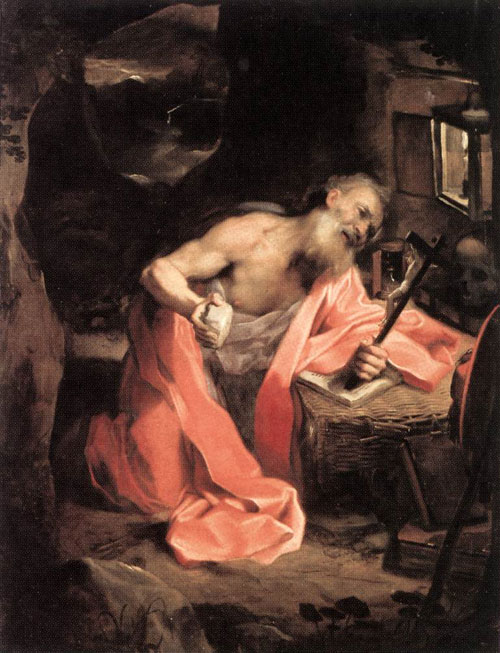
Was Saint Jerome,Â
The great name-caller
Who cared not a dime
For the laws of Libel
And in his spare time
Translated the Bible.
Quick to disparage
All joys but learning
Jerome thought marriage
Better than burning;
But didn’t like woman’s
Painted cheeks;
Didn’t like Romans,
Didn’t like Greeks,
Hated Pagans
For their Pagan ways,
Yet doted on Cicero all of his days.
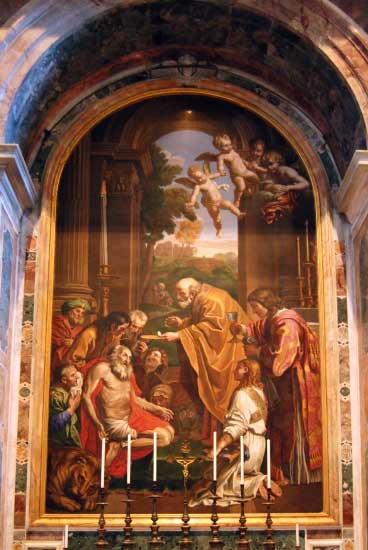
A born reformer, cross and gifted,
He scolded mankind
Sterner than Swift did;
Worked to save
The world from the heathen;
Fled to a cave
For peace to breathe in,
Promptly wherewith
For miles around
He filled the air with
Fury and sound.
In a mighty prose
For Almighty ends,
He thrust at his foes,
Quarreled with his friends,
And served his Master,
Though with complaint.
He wasn’t a plaster sort of a saint.
But he swelled men’s minds
With a Christian leaven.
It takes all kinds
To make a heaven
by Phyllis McGinley, from “Times Three: Selected Verse from Three Decades with Seventy New Poems”, (Pulitzer Prize Winner).
Tags: catholic, catholic podcast, catholic prayer, cathollc spirituality, father, fathers mike, love, mike aquilina, phyllis mcginley, saint jerome, St Jerome
This entry was posted on Tuesday, September 30th, 2014 at 12:13 pm
You can follow any responses to this entry through the RSS 2.0 feed.
The Sunday, Sunday, Sunday Podcast is a reflection on the upcoming Sunday Mass readings presented by LifeTeen.com and hosted by Mark Hart.
Sunday Readings from the USCCB
Responsorial Psalm PS 145:2-3, 8-9, 17-18
Reading 2 Â PHIL 1:20C-24, 27A
Gospel MT 20:1-16A
“The kingdom of heaven is like a landowner
who went out at dawn to hire laborers for his vineyard.
After agreeing with them for the usual daily wage,
he sent them into his vineyard.
Going out about nine o’clock,
the landowner saw others standing idle in the marketplace,
and he said to them, ‘You too go into my vineyard,
and I will give you what is just.’
So they went off.
And he went out again around noon,
and around three o’clock, and did likewise.
Going out about five o’clock,
the landowner found others standing around, and said to them,
‘Why do you stand here idle all day?’
They answered, ‘Because no one has hired us.’
He said to them, ‘You too go into my vineyard.’
When it was evening the owner of the vineyard said to his foreman,
‘Summon the laborers and give them their pay,
beginning with the last and ending with the first.’
When those who had started about five o’clock came,
each received the usual daily wage.
So when the first came, they thought that they would receive more,
but each of them also got the usual wage.
And on receiving it they grumbled against the landowner, saying,
‘These last ones worked only one hour,
and you have made them equal to us,
who bore the day’s burden and the heat.’
He said to one of them in reply,
‘My friend, I am not cheating you.
Did you not agree with me for the usual daily wage?
Take what is yours and go.
What if I wish to give this last one the same as you?
Or am I not free to do as I wish with my own money?
Are you envious because I am generous?’
Thus, the last will be first, and the first will be last.â€
Lectionary for Mass for Use in the Dioceses of the United States, second typical edition, Copyright © 2001, 1998, 1997, 1986, 1970 Confraternity of Christian Doctrine;
Tags: catholic, catholic podcast, catholic prayer, cathollc spirituality, gospel of matthew
This entry was posted on Friday, September 19th, 2014 at 5:15 am
You can follow any responses to this entry through the RSS 2.0 feed.
“Do not neglect justice, mercy and faith”
[powerpress]
an excerpt from today’s reflection by Don Schwager:
Jesus used the example of tithing to show how far they had missed the mark. God had commanded a tithe of the first fruits of one’s labor as an expression of thanksgiving and honor for his providential care for his people (Deuteronomy 14:22; Leviticus 27:30). The scribes, however, went to extreme lengths to tithe on insignificant things (such as tiny plants) with great mathematical accuracy. They were very attentive to minute matters of little importance, but they neglected to care for the needy and the weak. Jesus admonished them because their hearts were not right. They were filled with pride and contempt for others who were not like themselves. They put unnecessary burdens on others while neglecting to show charity, especially to the weak and the poor.
The scribes and Pharisees meticulously went through the outward observance of their religious duties and practices while forgetting the realities of God’s intention and purpose for the law – his love and righteousness (justice and goodness). Jesus used a humorous example to show how out of proportion matters had gotten with them. Gnats were considered the smallest of insects and camels were considered the largest of animals in Palestine. Both were considered ritually impure. The scribes went to great lengths to avoid contact with gnats, even to the point of straining the wine cup with a fine cloth lest they accidently swallowed a gnat. The stark contrast must have drawn chuckles as well as groans.
What was the point of Jesus’ humorous and important lesson? The essence of God’s commandments is rooted in love – love of God and love of neighbor, righteousness (justice and goodness), and mercy. God is love and everything he does, including his justice and goodness, flows from his love for us. True love is costly and sacrificial – it both embraces and lifts the burdens of others. Do you allow the love of God to shape and transform the way you live your daily life – including the way you think of others, speak of them, and treat them?
“Lord Jesus, fill me with your love and mercy that I may always think, speak, and treat others with fairness, loving-kindness, patience, and goodness.”
for the full reflection visit : Daily Reading and Meditation  Copyright © 2014 Servants of the Word
Tags: catholic, catholic podcast, catholic prayer, cathollc spirituality, gospel of matthew
This entry was posted on Tuesday, August 26th, 2014 at 12:09 am
You can follow any responses to this entry through the RSS 2.0 feed.
“Do not close the door to God’s kingdom”
[powerpress]
an excerpt from today’s reflection by Don Schwager:
How can we shut the door of God’s kingdom in our own personal lives? We close it through stubborn pride, disobedience, and ignorance. Do you submit your mind to God’s word or do you cling to your own thoughts and ideas of what is right, true, and good for you? Do you allow the world’s way of thinking to form the way you think, act, and speak – or do you allow God’s word of truth to form the way you think, act, and speak? Do you ignore God’s word through indifference or lack of reflection on his word?
The Lord Jesus wants to speak to us each and every day – to help us grow in our knowledge and understanding of his love and truth. The Lord is knocking at the door of your heart – are you receptive and ready to listen to his voice as he speaks through his life-giving Word? God’s kingdom is always present to those who seek him with a humble mind and a willing heart. The Lord invites us to pray daily, “May your kingdom come and your will be done on earth as it is in heaven” (Matthew 6:10).
“Lord Jesus, your word is life for me. May I never shut the door to your heavenly kingdom through my stubborn pride or disbelief. Help me to listen to your voice attentively and to conform my life more fully to your word.”
for the full reflection visit : Daily Reading and Meditation
Tags: catholic, catholic podcast, catholic prayer, cathollc spirituality
This entry was posted on Monday, August 25th, 2014 at 12:16 am
You can follow any responses to this entry through the RSS 2.0 feed.
The Sunday, Sunday, Sunday Podcast is a reflection on the upcoming Sunday Mass readings presented by LifeTeen.com and hosted by Mark Hart.
Sunday Readings from the USCCB
Reading 1Â Â IS 22:19-23
Responsorial Psalm PS 138:1-2, 2-3, 6, 8
Reading 2 Â ROM 11:33-36
Gospel MT 16:13-20
Jesus went into the region of Caesarea Philippi and
he asked his disciples,
“Who do people say that the Son of Man is?â€
They replied, “Some say John the Baptist, others Elijah,
still others Jeremiah or one of the prophets.â€
He said to them, “But who do you say that I am?â€
Simon Peter said in reply,
“You are the Christ, the Son of the living God.â€
Jesus said to him in reply,
“Blessed are you, Simon son of Jonah.
For flesh and blood has not revealed this to you, but my heavenly Father.
And so I say to you, you are Peter,
and upon this rock I will build my church,
and the gates of the netherworld shall not prevail against it.
I will give you the keys to the kingdom of heaven.
Whatever you bind on earth shall be bound in heaven;
and whatever you loose on earth shall be loosed in heaven.â€
Then he strictly ordered his disciples
to tell no one that he was the Christ.
Lectionary for Mass for Use in the Dioceses of the United States, second typical edition, Copyright © 2001, 1998, 1997, 1986, 1970 Confraternity of Christian Doctrine;
Tags: catholic, catholic podcast, catholic prayer, cathollc spirituality
This entry was posted on Friday, August 22nd, 2014 at 8:06 am
You can follow any responses to this entry through the RSS 2.0 feed.
“What is the greatest rule of life?”
[powerpress]
an excerpt from today’s reflection by Don Schwager:
God is love and everything he does flows from his love for us (1 John 3:1, 4:7-8, 16). God puts us first in his thoughts and concerns – do we put him first in our thoughts? God loved us first (1 John 4:19) and our love for him is a response to his exceeding goodness and kindness towards us. The love of God comes first and the love of neighbor is firmly grounded in the love of God. The more we know of God’s love, truth, and goodness, the more we love what he loves and reject whatever is hateful and contrary to his will. God commands us to love him first above all else – his love orients and directs our thoughts, intentions, and actions to what is wholly good and pleasing to him. He wants us to love him personally, wholeheartedly, and without any reservation or compromise.
What is the nature of love? Love is the gift of giving oneself for the good of others – it is wholly other oriented and directed to the welfare and benefit of others. Love which is rooted in pleasing myself is self-centered and possessive – it is a selfish love that takes from others rather than gives to others. It is a stunted and disordered love which leads to many hurtful and sinful desires – such as jealousy, greed, envy, and lust. The root of all sin is disordered love and pride which is fundamentally putting myself above God and my neighbor – it is loving and serving self rather than God and neighbor. True love, which is wholly directed and oriented to what is good rather than evil, is rooted in God’s truth and righteousness (moral goodness).
What makes our love for God and his commands grow in us? Faith in God and hope in his promises strengthens us in the love of God. They are essential for a good relationship with God, for being united with him. The more we know of God the more we love him and the more we love him the greater we believe and hope in his promises. The Lord Jesus, through the gift of the Holy Spirit, gives us a new freedom to love as he loves. Paul the Apostle writes, “For freedom Christ has set us free… only do not use your freedom as an opportunity for the flesh [sinful inclinations], but through love be servants of one another” (Galatians 5:1,13). Do you allow anything to keep you from the love of God and the joy of serving others with a generous heart?
“Lord Jesus, your love surpasses all. Flood my heart with your love and increase my faith and hope in your promises. Help me to give myself in generous service to others as you have so generously given yourself to me.”
for the full reflection visit : Daily Reading and Meditation
Tags: catholic, catholic podcast, catholic prayer, cathollc spirituality
This entry was posted on Friday, August 22nd, 2014 at 12:33 am
You can follow any responses to this entry through the RSS 2.0 feed.
“They would not come to the feast!”
[powerpress]
an excerpt from today’s reflection by Don Schwager:
This is certainly an invitation of grace – undeserved, unmerited favor and kindness! But this invitation also contains a warning for those who refuse it or who approach the wedding feast unworthily. God’s grace is a free gift, but it is also an awesome responsibility.
Cheap grace or costly grace?
Dieterich Bonhoeffer, a Lutheran pastor and theologian in Germany who died for his faith under Hitler’s Nazi rule, contrasted “cheap grace” and “costly grace”.
“Cheap grace is the grace we bestow on ourselves… the preaching of forgiveness without requiring repentance… grace without discipleship, grace without the cross, grace without Jesus Christ, living and incarnate… Costly grace is the gospel which must be sought again and again, the gift which must be asked for, the door at which a man must knock. Such grace is costly because it calls us to follow Jesus Christ. It is costly because it costs a man his life, and it is grace because it gives a man the only true life.”
God invites each of us as his friends to his heavenly banquet that we may celebrate with him and share in his joy. Are you ready to feast at the Lord’s banquet table?
“Lord Jesus, may I always know the joy of living in your presence and grow in the hope of seeing you face to face in your everlasting kingdom.”
for the full reflection visit : Daily Reading and Meditation
Tags: catholic, catholic podcast, catholic prayer, cathollc spirituality
This entry was posted on Thursday, August 21st, 2014 at 12:23 am
You can follow any responses to this entry through the RSS 2.0 feed.
“Do you begrudge my generosity?”
[powerpress]
an excerpt from today’s reflection by Don Schwager:
God is generous in opening the doors of his kingdom to all who will enter, both those who have labored a life-time for him and those who come at the last hour. While the reward is the same, the motive for one’s labor can make all the difference. Some work only for reward. They will only put in as much effort as they think they will get back. Others labor out of love and joy for the opportunity to work and to serve others. The Lord Jesus calls each one of us to serve God and his kingdom with joy and zeal and to serve our neighbor with a generous spirit as well.
The Lord Jesus wants to fill each one of us with the power and strength of the Holy Spirit so we can bear great fruit for God’s kingdom (the fruit of peace, joy, righteousness, and love) and also bring the fruit of his kingdom to our neighbor as well. We labor for the Lord to bring him praise, honor, and glory. And we labor for our neighbor for their welfare with the same spirit of loving-kindness and compassion which the Lord has shown to us.
Paul the Apostle reminds us, “Whatever your task, work heartily, as serving the Lord and not others, knowing that from the Lord you will receive the inheritance as your reward – you are serving the Lord Christ” (Colossians 3:23-24). Do you perform your daily tasks and responsibilities with cheerfulness and diligence for the Lord’s sake? And do you give generously to others, especially to those in need of your care and support?
“Lord Jesus,fill me with your Holy Spirit that I may serve you joyfully and serve my neighbor willingly with a generous heart, not looking for how much I can get, but rather looking for how much I can give.”
for the full reflection visit : Daily Reading and Meditation
Tags: catholic, catholic podcast, catholic prayer, cathollc spirituality, gospel of matthew
This entry was posted on Wednesday, August 20th, 2014 at 2:14 pm
You can follow any responses to this entry through the RSS 2.0 feed.
“Who can enter the kingdom of heaven?”
[powerpress]
an excerpt from today’s reflection by Don Schwager:
Why is Jesus so cautious about wealth? Wealth can make us falsely independent. The church at Laodicea was warned about their attitude towards wealth and a false sense of security: “For you say, I am rich, I have prospered, and I need nothing” (Revelations 3:17). Wealth can also lead us into hurtful desires and selfishness (see 1 Timothy 6:9-10). Look at the lesson Jesus gave about the rich man and his sons who refused to aid the poor man Lazarus (see Luke 16:19ff). They neglected to serve God. Only those who put their trust in God and who depend on him, and who share what they have with those in need, will find true peace, security, and happiness which lead to everlasting life and joy in God’s kingdom.
The Scriptures give us a paradox – we lose what we keep and we gain what we give away. Generosity will be amply repaid, both in this life and in the age to come (Proverbs 3:9-10, Luke 6:38). Jesus offers us an incomparable treasure which no money can buy and no thief can steal. The thing we most set our heart on is our highest treasure. Material wealth will shackle us to this earth unless we guard our hearts and set our treasure in God and his everlasting kingdom. Where is your treasure?
“Lord Jesus, you have captured our hearts and opened to us the treasures of heaven. May you always be my treasure and delight and may nothing else keep me from giving you my all.”
for the full reflection visit : Daily Reading and Meditation
Tags: catholic, catholic podcast, catholic prayer, cathollc spirituality
This entry was posted on Tuesday, August 19th, 2014 at 12:20 pm
You can follow any responses to this entry through the RSS 2.0 feed.

